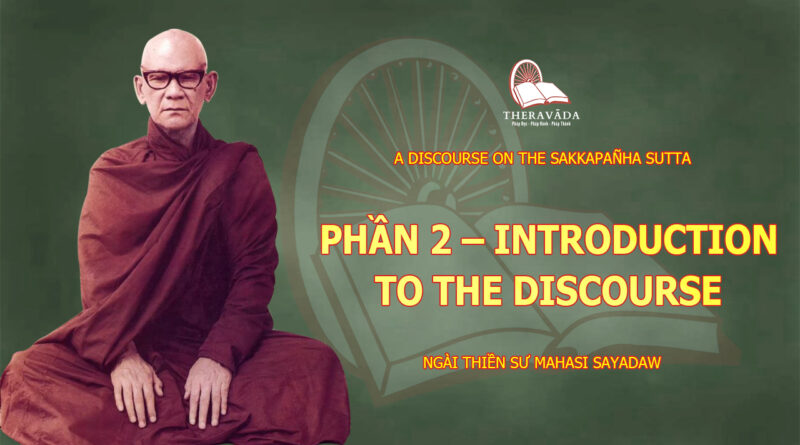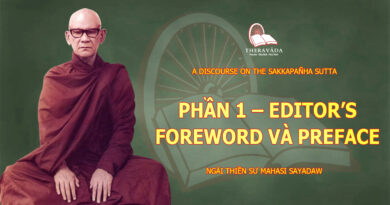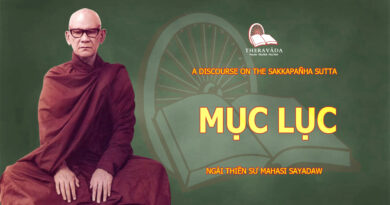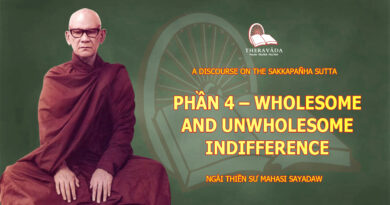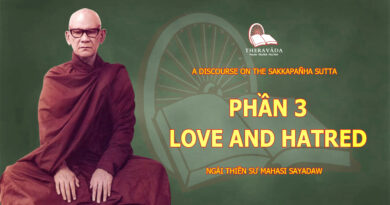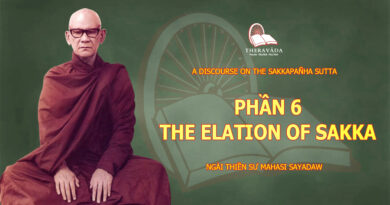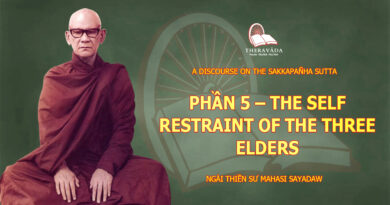Nội Dung Chính
Phần 2 – Introduction to the Discourse
– A Discourse on the Sakkapañha Sutta
– Substance of the Discourse
– Introduction to the Discourse
– Sakka’s Question and the Buddha’s Answer
– Meanness (macchariya)
A Discourse on Sakkapañha Sutta
Substance of the Discourse
In Buddhist literature, Sakka is the name given to the king of the gods (devas) and pañha means question. So the Sakkapañha Sutta is the discourse on the welfare of living beings that the Buddha gave to the king of the gods in response to his questions.
Sakka asked the Buddha as follows, “Venerable sir, there are devas, human beings, asuras, nāgas, gandhabbas and many other living beings. These beings wish to be free from quarrels, armed conflicts, animosity and unhappiness. Yet they are not free from these evils of life. What is the fetter (saṃyojana) that makes them unable to fulfil their wishes?”
Here the devas referred to are probably the Catumahārāja and Tāvatiṃsa devas for these devas were well known to Sakka. We know that the Asura devas were originally the enemies of the Tāvatiṃsa devas, as their battles are mentioned in the Dhajagga and other suttas. Formerly they lived in Tāvatiṃsa heaven but, while they were drunk, they were hustled down to the foot of Mount Meru by Sakka. The nāgas are a species of serpent who can work wonders with their psychic powers. The gandhabbas are a kind of Catumahārāja deva who excel in dancing, playing music and the other cultural activities of the celestial world. Then there are yakkhas (a kind of demonic god), animals and so forth.
The gods, humans and other beings of the sensual world have their hearts in the right place. They want to be free from hatred, not wishing to bear grudges nor to ill-treat others, nor to be ill-treated or robbed themselves. They do not want to become the enemies of other people. In short, all living beings long for security, peace, freedom and happiness. Yet they are all beset with danger, misery and suffering. What is the fetter that causes this situation? Today we hear the universal clamour for world peace and for the welfare of humanity, but these hopes for a happy world are still far from being realised. This naturally raises the question about the cause of our frustration.
In his reply, the Buddha described envy (issā) and meanness (macchariya) as the two fetters that lead to the unhappy plight of humanity.
Issā is envy that generates ill-will towards those who excel us. Macchariya is meanness that makes us reluctant to see others become as prosperous as ourselves. These two fetters of envy and meanness frustrate us and cause quarrels, enmity, danger and misery. Those who envy a man because of his prosperity, influence or status will be unhappy, however much they may talk about their desire for inner peace. Their unhappiness stems from the evil designs they harbour against the object of their envy. Naturally, those whom one envies become one’s enemies, and vice versa. Many people suffer from envy, and doubtless this envy will subject them to suffering beyond redemption throughout the cycle of existence.
Again, despite one’s desire to avoid conflict, meanness leads to it. One chafes at any person acquiring or using one’s property. One resents any intimacy between one’s beloved and another person; this is obvious in the case of married couples. Officials are unhappy when they face the prospect of their jurisdiction passing on to others. So meanness leads to enmity, danger, anxiety and misery.
To sum up the Buddha’s reply, the root causes of envy and meanness are the sense objects, which one either likes or dislikes, and discursive thinking about them. The remedy is to observe all phenomena arising from the six senses, to avoid unwholesome thoughts, and to entertain only wholesome thoughts.
This, then, is the substance of the discourse. Now a few words about the introduction to the discourse.
Introduction to the Discourse
The introduction to a discourse tells us where, why, to whom and by whom the discourse was given. Thus it serves to establish the authenticity of the Buddha’s teaching. Without it, the origin of a discourse is open to question, as in the Abhidhamma Piṭaka, which has no such introduction.
The Abhidhamma was taught by the Buddha in Tāvatiṃsa heaven. At that time the Buddha went daily to the Himalayan forest, leaving his proxy, the Nimitta Buddha, to carry on his regular teaching. The Buddha gave Venerable Sāriputta a summary of the Abhidhamma that he had taught for the day, and the chief disciple in turn taught it to five hundred monks. So the Abhidhamma is ascribed to Venerable Sāriputta but, as the Commentary says, since he heard it from the Blessed One, it is the teaching of the Buddha. The Abhidhamma Piṭaka has no introductory statement such as, “Evaṃ me sutaṃ: Thus have I heard:” so, according to the Commentary, some did not accept it as the true teaching of the Buddha.
So that posterity might have no doubt about the authenticity of the Buddha’s teachings, most of those included in the canon at the First Buddhist Council have introductions based on the questions and answers of the leading elders of the assembly. The exceptions are the Dhammapada and a few other discourses.
The introduction to the Sakkapañha Sutta is superb as it makes the discourse impressive and highlights the substance of the Buddha’s teaching. To record such an important event, Venerable Mahākassapa asked Venerable Ānanda where, to whom and why the discourse was taught, and Venerable Ānanda answered as follows.
Once the Buddha was dwelling in a cave that lay to the east of the city of Rājagaha in the country of Māgadha. At that time Sakka sought to see the Buddha. He had seen the Blessed One on the eve of His supreme enlightenment and at another time in Jetavana Monastery at Sāvatthi, but as he was then not yet spiritually mature, the Buddha did not grant him an interview. Now Sakka had decided to see the Blessed One, accompanied by his retinue of devas, because he hoped to hear a discourse that the Blessed One might teach to someone among his followers who was worthy of liberation. However, it was largely his fear of death that aroused his strong desire to see the Buddha. For, being aware that the end of his life was approaching, he was anxious for something to rely on for his salvation.
When a deva is about to pass away, five signs appear: 1) The flowers on his head wither, 2) His garments become dirty and worn out, 3) Though devas never normally sweat, he sweats from the armpits, 4) His youthful appearance gives way to signs of old age. 5) Finally, in the last week of his existence, he becomes weary of life. Having seen these five signs, Sakka reflected on his imminent death and became very depressed. To get over his depression, he decided to visit the Blessed One and listen to the Dhamma. Consequently, he appeared instantly near the Buddha’s residence, with his retinue of devas.
According to the Commentary on the Visuddhimagga, it took Sakka and his followers no longer than it takes to stretch or bend a hand for them to get from Tāvatiṃsa heaven to Māgadha. As the famous Commentary says, “Phenomena that arise in one place pass away just there, they do not pass on to another place.” The meditator who watches the bending and stretching according to the satipaṭṭhāna method is aware of the passing away of phenomena several times in an instant. Just as psycho-physical phenomena arise and pass away instantly, so too, the devas reached Māgadha within a split second through the successive flux of mind and matter. This was due to the divine power (kammajiddha) that gives devas a speed far greater than that of modern rockets or spaceships.
Sakka wanted the Buddha’s permission for his visit, so he told Pañcasikha deva to go and find out first whether the Blessed One was well disposed to welcome him. In Sakka’s statement the word ‘pasadeyyāsi’ occurs, which literally means ‘to make one cheerful’. According to the Commentary, it means gratifying a person and seeking his consent. It is a Pāḷi expression that Indians of the time used in speaking politely. It is somewhat like the saying of the jackal to the elephant in the Sanskrit work Hitopadesa. The jackal said, “My lord! Kindly make your eyes clear”, which means, as the expositor says, “Kindly help me or do me the favour.”
So in compliance with Sakka’s request, Pañcasikha went to the Buddha’s residence. Standing respectfully at a suitable distance from the Blessed One, he played his harp and sang songs about the Buddha, the Dhamma, the Saṅgha and the Arahants. The Buddha would not have approved of the deva’s way of honouring him with songs and music any more than he would have approved of some modern Burmese Buddhist practices, such as the melodious recitation of Pāḷi scriptures, the holding of pagoda festivals on a big scale, the killing of lots of animals for food for celebrations and so forth — practices that do a disservice to the Buddhist religion. However, the Buddha said nothing as he knew that many people would benefit from his dialogue with Sakka. Some of Pañcasikha’s songs were sensual in character, for they describe his infatuation with a beautiful goddess, which had made him almost crazy. His frustration shows that the deva world does not guarantee the fulfilment of all one’s desires and that the life of a deva is not always a bed of roses. His songs also contain references to the Buddha, the Arahant, and to the good deeds he had done on earth. He speaks of the Bodhisatta who is always mindful, absorbed in jhāna and bent on nibbāna.
Here jhāna means watching. The object that one watches may be the object of concentration, or it may be the nature of the mind and body such as impermanence, etc. After giving up self-mortification, the Bodhisatta resorted to breathing exercises and attained jhāna. These jhānic attainments centre on a single object of attention and may last for a couple of hours. It was through the power of jhāna that the Bodhisatta gained the knowledge of previous existences (pubbenivāsañāṇa), while sitting under the Bodhi tree in the early part of the night. At midnight he attained the divine eye (dibbacakkhu), which enabled him to see the passing away and coming into existence of all beings in the universe. In the last part of the night the Bodhisatta reflected on dependent origination and attained insight into the arising and dissolution of mind and matter while seeing, hearing, etc. This constant mindfulness of the nature of existence is a mark of mature wisdom, but it does not seem to have been well known to Pañcasikha deva. He knew only that the Bodhisatta reflected constantly and that he was intent on attaining the Deathless (amata) or nibbāna. The word amata comes from the Sanskrit amrita, which means deathlessness, and so amata refers to the deathless or nibbāna.
Questioned by the Buddha as to the origin of his songs, Pañcasikha said that he had composed them for serenading his beloved goddess. She was so delighted with his songs about the Buddha that she had allowed him to spend a day with her, a favour that she did not grant him again. Distraught and frustrated over his unrequited love, the deva gave vent to his feelings in his songs. Here the deva was no different from the ordinary person who is so overwhelmed with desire that he cannot think rationally.
Once, the disciple of a famous Sayādaw left the Holy Order after an affair with a woman. The Sayādaw’s followers blamed the couple but he admonished them thus: “You should not blame them. They have fallen into this predicament under the pressure of their craving. So you should blame their craving.” This is indeed a realistic teaching.
When the deva paid respect to the Buddha on behalf of his master, the Blessed One wished Sakka happiness in both body and mind. The Buddha expressed this wish because all living beings want happiness and that is the way that he blessed those who worshipped him. When Sakka expressed his adoration of the Buddha through the deva he was not uttering a prayer, but, by the Pāḷi words “abhivadeti abhivandati vandati” we are to understand that he expected to be assured of happiness. In other words, he hoped that the Buddha would say, “May you be happy!”
The Buddha blessed other devotees in the same way. This makes us question the modern practice of giving profuse blessings as a reward for mere devotion. The devotee prays for many things but his prayer is often at odds with the effusive blessing of the officiating monk. In fact, it is not necessary for the devotee to say anything further after expressing his reverence for the three gems (tiratana). Not that there are some things for which you should not pray, but there should be no incongruity between the prayer and the blessing. Since the monk usually mentions all the benefits accruing to one who does a good deed, all that he or she has to do is to express the desire to have them. In paying respect to the Buddha, Sakka did not pray for anything, but he was assured of the due benefits as mentioned in the words, “Abhivādanasīlissa, niccaṃ vuḍḍhāpacāyino, cattāro dhammā vaḍḍhanti, āyu vaṇṇo sukhaṃ balaṃ.” So it is well for devotees to pray for longevity, health and security, and the monk should bless them accordingly. He should not act as if he were decreeing the fulfilment of their wishes but only as someone contributing to it.
When Sakka and his followers came to pay respect to the Buddha, Sakka said that despite his ardent desire to see the Blessed One, he had been unable to do so because of his preoccupation with the affairs of the devas. He told the Blessed One how his experience accorded with what he had heard previously. It was said that the deva population increased when the Buddha appeared and he had found that this was true. After the Buddha’s teaching of the Dhammacakkappavattana Sutta, some observed the five precepts, some gave alms, and most of them attained the deva world after death. At the very least, those who had faith in the Buddha were assured of rebirth in the deva world. This was the view that the Buddha did not reject when it was expressed by a brahmā.
Faith in the Buddha means faith in the Dhamma and the Saṅgha, and as such it ensures protection from rebirth in the lower worlds. Moreover, even alms-giving to worthy disciples of the Buddha carries more kammic weight than any other act of generosity. Thus a deva who, as a lay follower of the Buddha in his previous existence, had given a spoonful of rice to an Arahant, was more powerful than another deva who, while on earth, had fed lots of people for many years as an act of charity.
Out of about a hundred million people in the central Gangetic valley, the original home of Buddhism, about eighty million people might have been Buddhists. Except for the Arahants and those at the Anāgāmi stage, most of those Buddhists might have attained the deva world. This probably accounts for the increase in the deva population of those days.
Sakka went on to narrate the story of Gopaka. A princess in the city of Sāvatthi named Gopikā was full of faith in the Buddha, and observed the five precepts strictly. She loathed womanhood, preferring to be a man, and so after her death she became the son of Sakka and was called Gopaka.
One day Gopaka saw three gandhabbas who came to entertain Sakka. He found out that they were formerly three monks whom he had supported. He wondered why they were now reborn as low-class devas despite their previous lives, whereas he himself, an ordinary woman in his past existence, had become the son of Sakka by virtue of faith and morality. The three gandhabbas then recalled their past lives and realised that their rebirth in the lower order of devas was due to their craving for the world of gandhabbas. Two of the devas practised meditation and became a Non-returner (anāgāmi) in a moment. The other deva, however, was unable to overcome his sensual attachment and so remained stuck in his lowly life.
Here, renewal of existence as a gandhabba, resulting from attachment to a former life of the same kind, is especially noteworthy. People are likely to be reborn in their native place and environment, which have a special influence over them. The three monks mentioned above are no exception in this respect. King Bimbisāra, who adored the Buddha and gave alms to the Saṅgha liberally for thirty-seven years, became a subordinate of a Catumahārāja deva after his death. He could have attained a higher deva world but for his attachment in previous lives, which leaves no doubt about the need to overcome attachment to one’s native place.
The two devas attained jhāna because they reflected on their recent practice of the Dhamma, and through insight meditation they attained stage of Non-return. You need not be disheartened by lack of success in meditation, for persistent effort will lead to rebirth in heaven. There you are assured of unusual spiritual experiences if you remember and continue to practise the Dhamma. For, as a discourse in the Aṅguttaranikāya says, the physical body of a deva is pure and radiant and the Dhamma becomes clearly manifest to one who has practised in his previous life. It may take some time to recollect, but recollection is instantly followed by attainment of insight knowledge. Some may forget it because of heavenly pleasure, but as devas they are physically and mentally alert, and so, once they turn their attention to the Dhamma through reflection or discourses, they understand and attain insight in a short time. If meditators who strive for spiritual experience do not have it in this life, they will certainly have it in the deva world.
As the deva world teems with sensual pleasure, those who have attained Non-returning cannot stay there and so they pass on to the brahmā world instantly. For Sakka, the transformation of the two devas into brahmās right before his eyes was very impressive. When he heard Gopaka’s explanation, he wished to share their spiritual experience. Moreover, the signs of his imminent death fuelled his desire for the life of a brahmā. If he heard the Dhamma, he might have a better future life even if he did not attain any insight. Hearing the Dhamma is indeed the best thing a deva can do on his deathbed.
Sakka’s Question and the Buddha’s Answer
As getting permission before asking questions is customary for a highly cultured individual, Sakka first sought the Buddha’s permission before asking the following:
“Venerable sir! All living beings wish to be free from anger and ill-will. They do not want to quarrel or to be ill-treated, but pray instead for happiness, security, peace and freedom. Yet they are not free from danger and suffering. What is the cause of this situation?”
The Buddha answered, “O King of devas! All living beings long for happiness, security, peace and freedom. Yet they are not free from hatred, conflicts, danger and suffering. This unhappy condition is due to the fetters of envy (issā) and meanness (macchariya).”
The characteristic of envy is aversion to the prosperity and welfare of others, which makes one malicious and destructive. These evil desires occasion suffering right now and also in the future for the person who harbours them, leading also to suffering for those who are envied. All over the world much suffering is caused by envy. The envious person hates to see happy or prosperous people. So the characteristic of envy is resentment of other people’s welfare, its function is to make the envious person miserable, and its manifestation is to shut one’s eyes to another person’s prosperity.
One who is dominated by envy does not want to see another person prosperous, successful, good-looking, educated or promoted to a high official position. Envy is an evil that does not benefit in any way the person who harbours it. It provides fertile soil for bad kamma and makes one miserable. A powerful man will seek to ruin the person whom he envies, and by so doing, he turns the other into his enemy who may pay him back in kind. Even if there is no danger of retaliation, he will surely suffer in an after life.
The Cūḷakammavibhaṅga Sutta sums up the kammic consequences of envy as powerlessness and a lack of influence. Some men and women do not want to hear anything about the good fortunes of another person — his wealth, intelligence, good health, eloquence and popularity, and so they say or do things that are detrimental to the other person’s interest. Propaganda in modern times is motivated by envy. The envy-ridden person suffers in hell for many years and after his release from there, if he is reborn in the human world, he becomes a low-class man with little influence and an insignificant reputation.
On the other hand, a man of goodwill rejoices at the good fortune of others. He is happy when he sees or hears of another’s prosperity and helps to promote others’ welfare as much as possible, thus cultivating much good kamma. He attains the deva world after death where he enjoys a happy life, and on return to the human world he is powerful and has many followers. So those who wish to prosper in this life and in the hereafter should overcome envy and cultivate sympathetic joy (muditā). In other words, they should rejoice at the welfare of other people.
Meanness
Meanness (macchariya) is meanness to the point of keeping one’s possessions secret. Its manifestation is not wanting others to share the object of one’s attachment, and it is characterised by extreme possessiveness. It is of five kinds as it relates to: 1) dwellings, 2) friends and associates, 3) material things, 4) commendable attributes, and 5) learning.
Meanness regarding dwellings (āvāsa-macchariya) is found among some monks who do not want to see other monks of good moral character dwelling in their monastery. A monk may not want his lay followers to give alms to other monks. Such envious monks, because of their ill-will, have to undergo many kinds of suffering after death.
Meanness regarding virtues (vaṇṇa-macchariya) is the desire to possess exclusively a special quality, such as physical beauty, while resenting the same quality in others, and it may lead to ugliness.
Meanness regarding knowledge (dhamma-macchariya) begrudges a person his learning or keeps back knowledge from him. This may make its victim a moron or an idiot in after lives. Thus meanness over the good fortune of other people makes a man unhappy, poor, friendless, and subject to great suffering after death.
Meanness regarding dwellings largely concerns the bhikkhus. It is the tendency to regard a communal monastery as one’s private residence. For lay people it is the tendency to have a similar attitude regarding public religious buildings such as temples, meditation centres and so forth.
Meanness regarding families (kula-macchariya) dominates those monks who do not want their lay followers to have close relations with other monks. Some monks forbid their disciples to see other monks or to hear their discourses. As for lay people, it is meanness to insist on the undivided and exclusive loyalty of one’s relatives.
Meanness regarding property (lābha-macchariya) is the desire in some monks to have a monopoly of alms and to deny them to other good monks. As an example of the saṃsāric suffering rooted in this evil, there is the story of Losaka Tissa.
In the lifetime of Kassapa Buddha there lived a certain monk who was dependent on a lay disciple for the necessities of life. One day another monk came and stayed at his monastery. Fearing that his disciple’s reverence for the new arrival might become a threat to his security, the resident monk tried to get rid of his guest. When the disciple invited both of them to take meals at his house, he went there alone. On his return he dumped by the wayside the food offered for the visiting monk. On his death he suffered for aeons in hell and from there he passed on to the animal world where he suffered extreme hunger for many lifetimes.
In his last existence he was reborn in a fisherman’s village in the country of Kosala. From the time of his conception, misfortunes befell the villagers and his parents. At last, the pangs of hunger made his mother so desperate that she abandoned the child while he was out begging. Venerable Sāriputta saw the starving child. Moved with pity, the elder took him to his monastery where, some years later, he became a bhikkhu. He was called Venerable Losaka Tissa because he was so unlucky that he never got a substantial meal even at a great feast. All he got was barely enough to sustain life.
This kammic evil dogged him even when he attained Arahantship. Shortly before his death, Venerable Sāriputta took him into Sāvatthi to see to it that he had a proper meal on the last day of his life. It is said that there was no one to offer food to the elder so he sent his companion to a rest-house. Only then did the disciples offer the food, some of which he sent to Venerable Losaka Tissa, but the men who were supposed to take it to him ate it on the way there. So he had to bring more food himself and hold the bowl while Venerable Losaka Tissa ate the food. In this way Venerable Losaka Tissa had his last meal and passed away on that very day.
This story leaves no doubt about the frightful kammic consequences of meanness. Many kinds of meanness afflict lay people, as for example, lābha-macchariya in those who seek to monopolize a lucrative business; vaṇṇa-macchariya in those who do not recognise the good attributes of others; and dhamma-macchariya in those who do not wish to share their knowledge with anyone else.
The Buddha’s statement attributing mankind’s unhappiness to envy and meanness was directly relevant to Sakka. For, in view of his approaching end, he was unhappy at the prospect of his wives falling into the hands of his successor, and at the thought of the latter outshining him. So from experience he realised the truth of the Buddha’s answer and asked another question.

